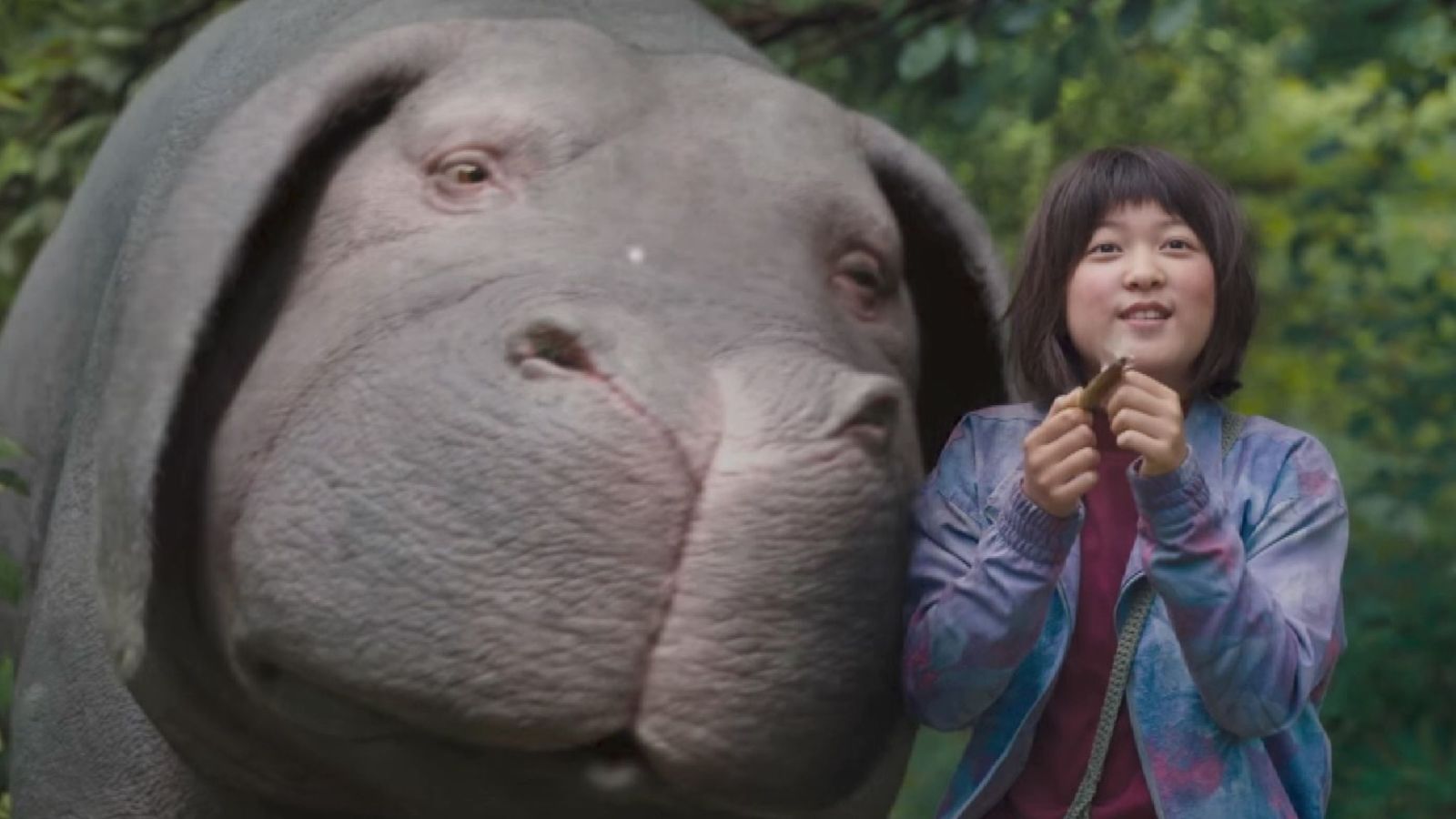Bong Joon Ho is in a war with Chan-wook Park for the title of best living director from Korea. Park stormed out of the gate first, giving us the non-Spike Lee Oldboy. Ho countered with a double dose of the non-American remake The Host and the crazy fun Snowpiercer. Park took a while, but he countered with one of the best films of 2016, The Handmaiden. Ho hopes to regain his supremacy this year by adding Netflix into the equation. Ho’s Okja contains pieces of the bonkers nature of Snowpiercer, but it lacks the Snowpiercer train e.g. a cohesive element of the story that keeps the lunacy from collapsing the story.
We open with Lucy Mirando (Tilda Swinton) of the Mirando Corporation selling everyone on her new “Save the Planet” project: super pigs. Mirando is doing this because she is trying distance the company from her sister Nancy (also Swinton) the all-in businesswoman who only thinks of the bottom line. Lucy sends the pigs to every great farmer across the globe, and in 10 years, would award a winner to the best farmer. Well 10 years later, one such pig is Okja, being raised by Korean farmer Hee Bong (Hee-Bong Byun) and his daughter Mija (Seo-Hyun Ahn). Mija loves Okja much like a pet dog and hopes Hee Bong will pay to keep Okja from going back to America. Well, sellout doctor Johnny Wilcox (Jake Gyllenhaal) puts a damper on those plans, declaring Okja the winner and stealing Okja back to New York City. Mija, furious with her grandfather, tries to get Okja back. She is aided by a ALF, a PETA like animal rights organization led by Jay (Paul Dano), K (Steven Yeun), and Red (Lily Collins), who want to use Okja to expose Mirando for the awful corporation that they are.
Okja’s overstuffed, for sure. There’s lots of stuff crammed into this movie, giving you a kitchen sink feel for the movie. First, the good: the political messaging is pretty potent. The movie posits that at their center, corporations will only listen to money, and even well meaning people inside corporations are susceptible to manipulation. Corporate entities are fine parading these well meaning people out on TV because it makes them look good, but behind the scenes, they take these people and give them money or subtle word manipulation to push the true motives on the face of the company, having them merge their ideals with the company’s, but having these people not realize what’s going on. At it’s core, this money-centric philosophy cares not for morality, just for how they can profit, driven home agonizingly by the final 15 minutes as Mija’s quest collides with the Mirando corporation. Also helping here is the CGI rendering of Okja. The audience will think of their own pets or if they’re farmers, their own animals. Okja has thoughts, feelings, and is a very emotional creature. Though not traditionally cute, you’ll have no trouble connecting with Mija and Okja’s relationship, and have you rooting the girl finds a way to get her friend back from the clutches of the soulless corporation.
Were the corporate culture and Mija’s quest to recapture her friend the sole focus of the story, Okja would have been a killer satire of American values. However, there’s SO much more subplotting going on that gets in the way and threatens to burst the story apart. The animal rights group is necessary to keep the plot going because of their resources, but there are mostly needless subplots about their internal bickering at what it means to deliver promises that would have been better if their screentime was increased to parallel the corporate behavior, but it feels mostly added on to justify hiring Paul Dano, Steven Yeun and Lily Collins. The biggest glaring mistake is Jake Gyllenhaal, ironically. The actor in recent years has carried some truly great pictures, but here, he’s playing lunacy when the part would have been better as a cold corporate shill, almost like his Nightcrawler character. This feels more like direction than Gyllenhaal himself, but other than some laughs, he mostly belongs in another movie.
Despite my complaints, Okja is never NOT interesting. Bong Joon Ho has a real eye for incisive commentary on the culture around him, and Okja’s best parts emphasize Ho’s talents at delivering the message home through film. As far as the battle with Mr. Park, you’ll have to do better, Bong Joon Ho, The Handmaiden was pretty amazing and Chan-wook Park still holds the Korean filmmaker championship belt.

